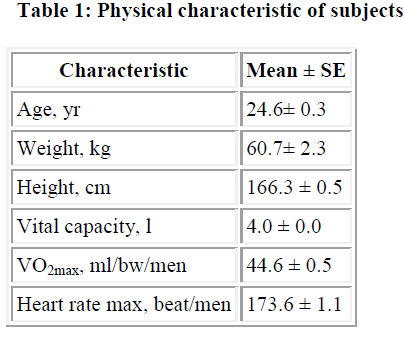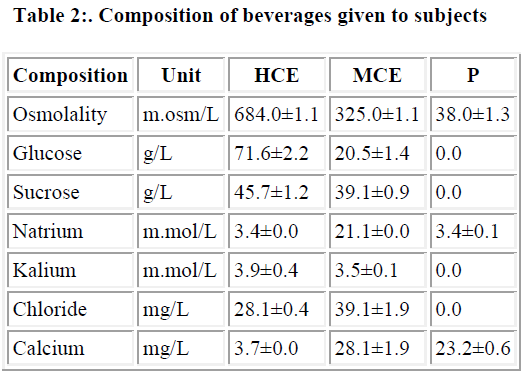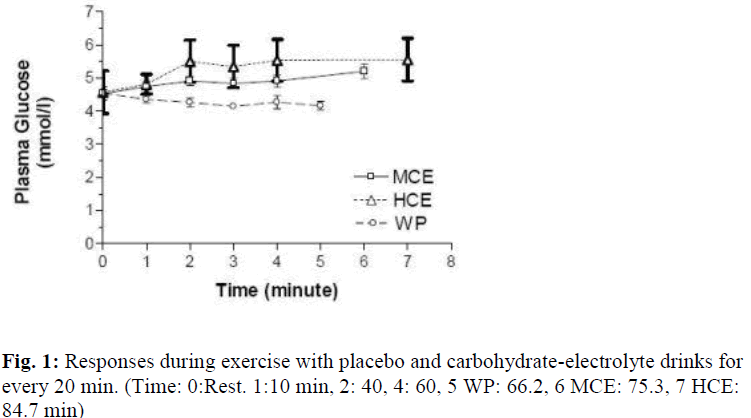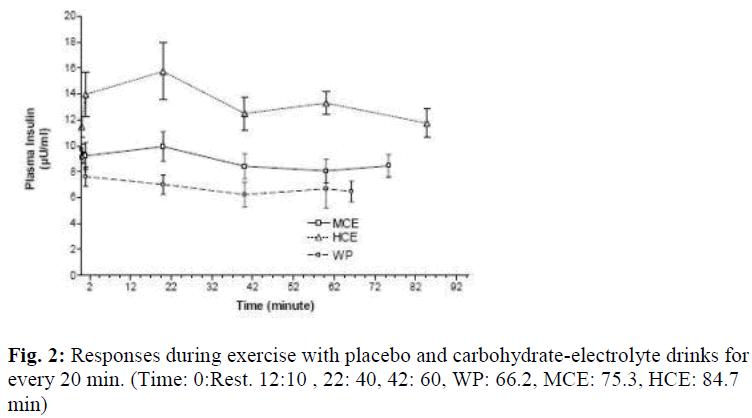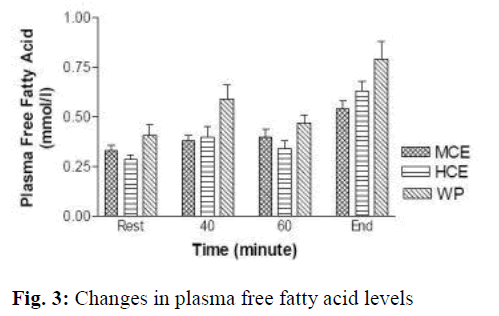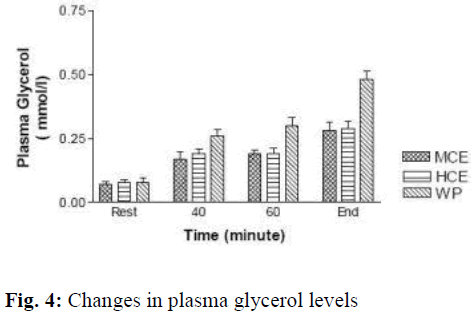ISSN: 0970-938X (Print) | 0976-1683 (Electronic)
Biomedical Research
An International Journal of Medical Sciences
- Biomedical Research (2006) Volume 17, Issue 3
Ingestion of carbohydrate-electrolyte beverage improves exercise performance
Gusbakti R*
Department of Physiology, Faculty of Medicine, Islamic University North Sumatra, Indonesia
The purpose of this study was determine effects of ingestion carbohydrate-electrolyte beverage drink to improve exercise performance in the heat. Ten male subjects (age 18-30 years) were subjected to cycle ergometer at 63.5 ± 3.3% of maximal O2 consumption (VO2max) with a pedal speed of 60 rpm until they became fatigued. They were given a drink of carbohydrate-electrolyte at a concentration of 6%, 12% and a flavored water placebo (WP) to consume at a volume of 3 ml/kg/body weight every 20 minutes. Blood samples were taken at rest and during exercise at every 10 minutes for analyzing plasma glucose, insulin, free fatty acid and glycerol. Mean exercise time until the on set of fatigue in subjects was found to be significantly longer (P<0.001) following the ingestion of carbohydrate-electrolyte beverage (84.7 ± 6.9 min) compared with WP (66.2± 2.2 min). However, plasma glucose concentration was found to be significantly lower in the WP ingested subjects compared to carbohydrate electrolyte ingested ones (4.5 ± 0.2 m.mol/L vs 4.3 ± 0.2 m.mol/L, ANOVA, P<0.05). When carbohydrate electrolyte beverage maintained plasma glucose concentration at 4.5 – 5.5 m.mol/L, the subjects exercised for an additional hour before being fatigued. The levels of plasma insulin from 40 minute until the end of exercise were decreased in all beverage ingested subjects. Results indicate that carbohydrate-electrolyte beverage supplementation during prolonged cycling improves physical performance.
Keywords
Physical performance, fatigue, blood glucose, insulin
Abstract
The purpose of this study was determine effects of ingestion carbohydrate-electrolyte beverage drink to improve exercise performance in the heat. Ten male subjects (age 18-30 years) were subjected to cycle ergometer at 63.5 ± 3.3% of maximal O2 consumption (VO2max) with a pedal speed of 60 rpm until they became fatigued. They were given a drink of carbohydrate-electrolyte at a concentration of 6%, 12% and a flavored water placebo (WP) to consume at a volume of 3 ml/kg/body weight every 20 minutes. Blood samples were taken at rest and during exercise at every 10 minutes for analyzing plasma glucose, insulin, free fatty acid and glycerol. Mean exercise time until the on set of fatigue in subjects was found to be significantly longer (P<0.001) following the ingestion of carbohydrate-electrolyte beverage (84.7 ± 6.9 min) compared with WP (66.2± 2.2 min). However, plasma glucose concentration was found to be significantly lower in the WP ingested subjects compared to carbohydrate electrolyte ingested ones (4.5 ± 0.2 m.mol/L vs 4.3 ± 0.2 m.mol/L, ANOVA, P<0.05). When carbohydrate electrolyte beverage maintained plasma glucose concentration at 4.5 – 5.5 m.mol/L, the subjects exercised for an additional hour before being fatigued. The levels of plasma insulin from 40 minute until the end of exercise were decreased in all beverage ingested subjects. Results indicate that carbohydrate-electrolyte beverage supplementation during prolonged cycling improves physical performance.
Introduction
Profuse sweating during sustained exercise in hot climate results in dehydration and consequently, causes a reduction in plasma volume [1]. Dehydration is associated an impairment of body heat dissipation and endurance performance. The disproportionate rise in core temperature results from the reduction in cutaneous blood flow [2] and the rate of sweating [3]. When dehydration is minimized by fluid replacement, individuals can work longer in the hot climate with a minimal increase in core temperature [3,4]. Thus, fluid replacement during prolonged exercise in the hot climate is important to maintain the endurance performance and to prevent the thermal injury [5]. In contrast, recent investigations indicate that a moderately concentrated beverage containing 6-8% carbohydrate dose not adversely affect thermoregulation or circulatory function [6,7,8,9] and may improve exercise performance in heat [6,10]. However, the majority of these studies have focused on fluid replacement during cycling and are mainly laboratory based. This is due, in part to the relative ease of ingesting large amount of fluid and collecting data during stationary cycling.
Recently it has been reported that carbohydrate ingestion during prolonged strenuous exercise (i.e., 74% of max O2 uptake) can delay the development of fatigue [11]. Although muscle glycogen data are missing, Bergström and Hultman [12] and Bagby et al [13], have suggested that carbohydrate administration may result in increased utilization of blood glucose with a proportional slowing of muscle glycogen depletion.
The purpose of this study was to examine the effect of ingesting carbohydrate- electrolyte mixture of 6% (MCE), 12% (HCE) or a flavored water placebo (WP) whether adequate to improve exercise performance during cycling at 31°C and 91% relative humidity.
Material and Methods
Methods
Ten healthy recreational athletes were subjected to exercise on a cycle ergometer (Lode). Subjects were tested for maximal oxygen uptake (VO2max) before any of the experimental trial initiated. Percent age of body fat was estimated form skin fold. The solutions to be tested were two carbohydrate-electrolyte drinks and an artificially flavored water placebo. The characteristic of the drinks is detailed in table 2. Each subject was tested in a random order under each of three conditions using a double blind design with a gap of two week between the each trial. All subjects had given their consent prior to participation.
Preliminary testing
All exercise tests were performed using an electrically braked ergometer at a work load requiring 60% of VO2max in a session two week prior to the filed trial. The subjects were instructed to maintain a pedal speed of 60 rpm until fatigued. Standard laboratory conditions (31°C, 91% relative humanity) were maintained throughout the course of the study.
Experimental design
Subjects were instructed to maintain a constant diet and training schedule throughout the experimental period, especially 2 days prior to each exercise bout. For all trials, subjects had reported to the laboratory in the morning after a period of 10 – 12 hour fasting. An 18-gauge catheter was inserted into the superficial forearm vessel. To obtain rectal temperature, a thermocouple probe was inserted up to 10 cm into the rectum. Electrodes and thermocouple were secured to the skin for monitoring heart rate (HR) and skin temperature, respectively. In the morning, subjects were allowed to consume water but no solid food. Five minute prior to start cycling, subjects had consumed 3 ml/kg/body weight of MCE, HCE and water placebo and kept consuming the same schedule in during every 20 minutes exercise.
Biochemical analysis
Blood samples (10 ml) were obtained at rest and during exercise in every 10 minute until fatigued, centrifuged at 4°C, and plasma samples were used for measuring insulin ( by using radioimmunoassay kits, Diagnostic Product Corporation), free fatty acid (Bohringher M.Gmbh,free fatty acid) [14], glycerol (Bohringher M.Gmbh, Glycerol) [15] and glucose (Bohringher M.Gmbh, Peridochrom Glucose).
Expired gas was collected in “metabolic measurement cart” (sensor medics 2900) at rest and during exercise for every 10 minute until exhausted. Respiratory exchange data were determined using computer-based system. Carbohydrate oxidation was calculated based on consumption and respiratory exchange ratio (RER) measurements. Heart rate (HR) was continuously monitored by telemetry, whereas rating of perceived exertion was obtained at a 20-minute intervals during exercise [16].
Statistical analysis
All data were analyzed using a two-way ANOVA. Student’s t-test, was used for determining the level of significance (P< 0,05).
Results
Characteristics of the subjects are given in Table 1 (individual values for body weight, maximum O2 consumption, vital capacity and heart rate maximal). Characteristic of beverages is show in Table 2.
Carbohydrate-electrolyte beverage improves exercise performance
Period of exercise leading to fatigue
We first studied ten subjects until fatigued of cycling at 60% VO2max, with and without the carbohydrate-electrolyte drink. Mean exercise time until fatigued in subjects was found to be 22 % longer when ingested with carbohydrate-electrolyte drink compared with the water placebo solution (i.e., 84.7±6.9 min vs 66.2±2.2 min; P < 0.001). All subjects showed improvement in performance with a range from 20 to 70 minute, when ingested with carbohydrate-electrolyte drink.
Perceived exertion and heart rate
Perceived exertion increased gradually and was not different during the first 1 hour of exercise when subjects were given carbohydrate-electrolyte drink or the placebo solution. Perceived exertion increased rapidly after 1 hour of exercise in the placebo trial and just prior to the point of fatigue it was significantly elevated (P < 0.05 ) above that reported after 75 min of exercise in subjects who had carbohydrate-electrolyte drink. Heart rate was increased rapidly after 20 min of exercise for all beverages trials before and during the exercise leading to fatigue (P < 0.05 ).
O2 uptake and respiratory exchange ratio
Cycling exercise elicited an average VO2 of 30.9±1,5 ml/minute (i.e., 64.0±1.2% of VO2max) after 10 minute of exercise and did not change but remained almost identical with all beverage. Respiratory exchange ratio(R) remained stable at 1.06-1.05 during 20 minute of exercise but began to decline at 2nd hour to a value of 1.02±0.01 and at fatigue, no significantly change was noted even after the ingestion of beverages.
Plasma glucose and insulin responses
As show in Fig. 1, plasma glucose level at at rest were 4.4+ 0.1 m.mol/L (MCE), 4.5+ 0.2 m.mol/L (HCE) and 4.5+ 0.2 m.mol/L (WP), respectively. In water placebo (WP) trial there was a downward trend in plasma glucose compared to that seen in the carbohydrate-electrolyte trial. However, at the end of the WP trial, severe hypoglycemia was never noted. As a result a strong counter regulatory response was not elicited. In the subjects which received WP, the level of plasma glucose in them continued to decline at 40 minute from 4.5 + 0.2 m.mol-1 to 4.3 + 0.2 m.mol/L (ANOVA, P<0.05), and at the final hour of exercise the levels declined from 4.5 + 0.2 m.mol-1 to 4.1+ 0.2 m.mol/L (ANOVA, P<0.01). When subjects had the drink of carbohydrate-electrolyte, plasma glucose concentration remained significantly higher at 20 min compared with WP (MCE 5.2+ 0.2 m.mol/L vs 4.3+ 0.1 m.mol/L; P<0.05, HCE 5.5+ 0.3 m.mol/L vs 4.3+ 0.1 m.mol/L ;P< 0.01). However plasma glucose was maintained at 4.5 – 5.5 m.mol/L throughout the cycling period (ANOVA, P< 0.001) compared to placebo from 70 minute to the end of exercise. As shown in Fig 2, plasma insulin concentrations at rest were 11.4+0.1 μU/ml in HCE, 9.1+0.4 μU/ml in MCE and 9.7+O.4 μU/ml in WP, respectively. During exercise, ingestion of MCE and HCE elevated the levels at 20 min in MCE to 9.9+1.1 μU/ml vs 7.0+0.7 μU/ml; P<0.05, and in HCE 15.77 2.1 μU/ml vs 7.0+0.7 μU/ml; P<0.01. However, after 40 min to scheduled the end, the levels of insulin gradually declined irrespective of the beverages (for MCE 8.4+0.8 μU/ml vs 6.9+0.5 μU/ml; P<0.05, and for HCE 11.7+1.0 μU/ml vs 6.9+0.5 μU/ml; P<0.01), respectively.
Plasma free fatty acids and glycerol responses
As shown in Fig 3, plasma FFA concentration began to rise rapidly during exercise starting from 40 min with the placebo compared to carbohydrate-electrolyte ingestion groups (p < 0.01). FFA concentrations remained elevated until the subjects became fatigued irrespective to fatigue for three drink of the drinks ingested (P<0.001). The pattern of increase in blood glycerol and FFA was found to be almost identical.
The major finding of this present study was that a carbohydrate-electrolyte beverage enhances cycling performance (> 1 hour duration) in the set climate, by maintaining thermoregulatory and circulatory function almost similar to that water placebo. The findings of this study are in agreement with the earlier laboratory based investigations which have found that carbohydrate replacement has an ergogenic effect on cycling performance in the heat [17]. This study showed that the total cycling time until fatigued became significantly (P<0.01) prolonged with carbohydrate-electrolyte preparation of 12% (84.7±6.9 min, 22%) and carbohydrate-electrolyte preparation of 6% (75.3±3.4 min, 12%) compared with water placebo (66.2±2.2 min). Attempts to supplement the energy supply of the working muscle with the ingestion of carbohydrate during exercise has been shown to result in a reduction in muscle glycogen utilization [18] and improvement in endurance performance [11,19]. The performance data demonstrated that, when the subjects ingest carbohydrate-electrolyte drink, their physical performance is significantly increased compared to water placebo alone. Many of the previous studies have shown performance benefits subsequent to carbohydrate ingestion using formulations similar to those employed in this study [11,19,20].
Numerous investigations have reported beneficial effect of ingesting various amount or forms of carbohydrate during prolonged exercise. The time to exhaustion [11,17,19,21], spring performance [18,22], and work output [23] have been observed to increase as a result of carbohydrate intake. Higher blood glucose levels following carbohydrate feeding compared to water placebo control have been reported [11,17,18,19]. Coyle et al. [11], have proposed that the improvement in performance may be partially attributed to the maintenance of plasma glucose. In the present study, plasma glucose was found to remain significantly higher in the carbohydrate-electrolyte ingested groups of 12% or 6% compared to the water placebo throughout the steady state of cycling. This elevated glucose level provides a possible explanation for enhanced performance following carbohydrate replacement.
It has been shown that the rise in cortisol and noradrenalin in the blood may inhibit the release of insulin [2]. Degradation of plasma insulin during exercise can indirectly lead to lipolysis which replaces glucose and also hepatic glycogen as the source of energy during exercise. Regardless of these differences, corresponding our study demonstrated that a higher levels of plasma glucose and insulin are maintained with a lower plasma free fatty acid and glycerol with water placebo drink, but not with carbohydrate-electrolyte drinks. The higher plasma glycerol with water placebo possibly suggest that the body possibly be using fatty acids as the substrate for energy [24,25]. Use of fatty acid during prolonged exercise in response to hormone, cortisol, growth hormone and adrenaline suggest that the blood borne substrates replace carbohydrate as the source of energy [26].
In conclusion, we have observed that carbohydrate drinks during prolonged exercise are sufficient to maintain carbohydrate oxidation and is sufficiently delay the onset of fatigue. It moreover, appears that when the plasma glucose concentration is maintained, endurance appears to be significantly enhanced during exercise. The improvement in exercise performance appears to be associated with an increase in carbohydrate availability and subsequent enhancement of oxidation by active muscle. The findings of this study also indicate that 12 % or 6 % carbohydrate-electrolyte beverage acts as a fluid replacement drink in terms of thermoregulation, maintenance of physiologic status in exercise induced dehydration.
Acknowledgements
The authors gratefully acknowledge the support of: Prof Rabindarjeet, Prof Sirisinghe, Ang Boon Sueng, Low Ai Ling,Maziah. The advice and critical review of the manu-script by Prof Khairul Anuar are much appreciated..
References
- Adolph EF. Blood changes in dehydration. In: Physiology of Man in Desert, Adolph EF and Associated (Eds.). New York: Interscience 1947; pp 160-171.
- Nadel ER, Fortney SM, Wenger CB. Effect of hydration state on circulatory and thermal regulations. J Appl Physiol: Respirat Environ Exerc Physiol 1980; 49: 715-21.
- Fortney SM, Wenger CB, Bove JR. Effect of blood volume on sweating rate and body fluids in exercising humans. J Appl Physiol: Respirat. Environ. Exerc Physiol 1981; 51: 1594-1600.
- Gilosofi CV, Copping JR. Thermal effects of prolonged treadmill exercise in the heat. Med Sci Sport 1974; 6: 108-113.
- Wyndhan CH, Strydom NB. The danger of an inadequate water intake during marathon running. S A Med J 1969; 43: 893-96.
- Davis JM, Lamb DR, Pate RR, Slentz CA, Burgess WA, Bartoli WP. Carbohydrate-electrolyte drinks: effects on endurance cycling in the heat. Am J Clin Nutr 1988; 48: 1023-30.
- Millard-Stafford MLP, Rosskopf LB, Hinson BT, Di-carlo LJ. Carbohydrate-electrolyte replacement during a simulated triathlon in the heat. Med Sci Sports Exerce 1990; 22: 621-628.
- Murray RD, Seifert JG, Eddy DE, Paul GL, Halaby GA. Carbohydrate feeding and exercise effect of beverage Carbohydrate content. Eur J Appl Physiol 1989; 59: 152-158.
- Seidman DS, Ashkenazi I, Arnon R, Shapiro Y, Epstein Y. The effect of glucose polymer beverage ingestion during prolonged outdoor exercise in the heat. Med Sci Sports Exerc 1991; 23: 458-462.
- Noakes, TD, Admas KH, Myburgh C, Greeff T, Lotz, Nathan M. The danger of inadequate water intake during prolonged exercise: a novel concept revisited. Eur J Appl Physiol 1988; 57: 210-19.
- Coyle EF, Hagberg JM, Hurley BF, Martin WH, Ehsani AA, Holloszy JO. Carbohydrate feeding during prolonged strenuous exercise can delay fatigue. J Appl Physiol 1983; 55: 230-235.Bergström JL, Hultman E. A study of glycogen metabolism during exercise in man. Scand J Clin Lab Invest 1969; 19: 218-223.
- Bagby GJ, Green HL, Katsuta S, Gollnick PD. Glycogen depletion in exercising rats infused with glucose, lactate or pyruvate. J Appl Physiol 1978; 45: 425-429.
- Chromy V, Gergel J, Voznicek J, Krombholzova L, Musil J. Assay of serum free fatty acids by extraction photometric procedure. Clin Chim Acta 1977 ; 80: 327-332.
- Laurel S, Tibbling G. An enzymatic fluorometric micromethode fo determination of glycerol. Clin Chim Acta 1966; 13: 317-322.
- Borg G. Simple rating methods for estimation of perceived exertion. In: Physical Work and Effort, edited by G. Borg. New York: Pergamon 1975; pp 39-46.
- Coyle EF, Coggan AR, Hemmert MK, Ivy JL. Muscle glycogen utilization during prolonged strenuous exercise when fed carbohydrate. J Appl Physiol 1986; 61: 165-172.
- Hargreaves MDL, Costill A, Coggan A, Fink WJ, Nishibatta. Effect of carbohydrate feeding on muscle glycogen utilization and exercise performance. Med Sci Sport Exerc 1984; 219-222.
- Ivy JL, Costill. DL, Fink WJ, Lower RW. Influence of caffeine and carbohydrate feeding on endurance performance. Med Sci Sports 1979; 11: 6-11.
- Ivy JL, Miller W, Dover V, et al. Endurance improved by ingestion of glucose polymer supplement. Med Sci Sports 1983; 15: 466-471.
- Fallowfield JL, Williams C. Carbohydrate intake and recovery from prolonged exercise. Int J Sport Nutr 1993; 3: 150-164.
- Fielding RA, Costill DL, Fink WJ, King DS, Har-greaves M, Kovaleski J. Effect of carbohydrate feeding frequencies and dosage on muscle glycogen use during exercise. Med Sci Sports Exerc 1985; 17: 471-476.
- Nueffer PD, Costill DL, Flynn MG, Kirwan JP, Mitchell JB, Houmard JA. Improvement in exercise performance: effects of carbohydrate and diet. J Appl Physiol 1987; 62: 983-988.
- Ahlborg G, Felig P, Hagenfeldt L, Hendler R, Wahren J. Substrate turnover during prolonged exercise in man. Splanchnic and leg metabolism of glucose, free fatty acids and amino acids. J Clin Invest 1974: 53: 1080-1090.
- Maron MB, Hovarth SM, Wilkerson JE. Acute blood biochemical alterations in response to marathon running. Eur J Appl Physiol 1975; 34: 173-181.
- Costill DL, Coyle E, Dalsky G, Evans W, Fink WJ, Hoopes DG. Effects of elevated plasma FFA and insu-lin on muscle glycogen usage during exercise. J Appl Physiol 1977; 43: 695-699.
